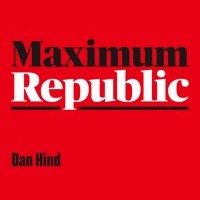
What can republicanism offer the left?
This article was originally published at Justice Everywhere. When you tell people that you work on republicanism, you are often met by a concerned look. You then have to rush to explain that by ‘republicanism’ you, of course, do not mean the party of Trump and Palin. Nor – you then have to add – do you only mean that you take a particular dislike to Elizabeth Windsor. This public understanding of republicanism looks set to only get worse, with the French centre-right UMP party, last year, successfully renaming itself Les Républicains. The prospects for recovering republicanism for leftist politics might therefore not seem particularly promising. The label ‘republican’ might simply be too poisoned by its associations with right-wing parties or too easily …

Taking Back the Economy: The market as a Res Publica
Republicans seek to protect and promote individual freedom. So do libertarians of the right. The difference? Republicans recognise that the market is constructed through political, public action. Freedom in the republican tradition requires enjoyment of the fundamental liberties with the security that only a rule of law can provide. You must be publicly protected and resourced in such a way that it is manifest to you and to all that under local (not unnecessarily restrictive) conventions: you can speak your mind, associate with your fellows, enjoy communal resources, locate where you will, move occupation and make use of what is yours, without reason for fearing anyone or deferring to anyone. You have the standing of a liber or free person; you enjoy equal status under the public order and you share equally in control over that order. [This post is part of the Democratic Wealth series, hosted by Politics in Spires in partnership with Our Kingdom.]

What do today’s republicans have to say about work?
Historically, republicanism has failed to reconcile the principle of non-domination with the realities of economic life. What do contemporary republican thinkers have to say about work and domination? [This post is part of the Democratic Wealth series, hosted by Politics in Spires in partnership with Our Kingdom. It is Part Two of a two-part piece on the history of republicanism and work]

Revolutionary France and the social republic that never was
After the 1830 revolution, French workers waited for the introduction of the republic into the heart of production. It never came. The struggle that ensued was to shape French politics during the Second Republic and after as republicans sought to reconcile work with the principle of non-domination. [This post is part of the Democratic Wealth series, hosted by Politics in Spires in partnership with Our Kingdom.]

Civic Republicanism in Spain: A North Star for hard times
The key principle of Republicanism is to minimise domination wherever it is found. The Zapatero governments in Spain, for example, showed how this idea can shape the policies of nation states. Is it possible to extend Republican principles to the global arena? I’ll start with what everybody knows. We live in hard times. There is much more suffering in Europe right now than just five years ago – much more domination too. Arguably, a sort of global redistribution is benefiting ‘developing’ countries to the detriment of the ‘developed’ world. But Western democracies are doing badly, and their prospects are not promising. [This post is part of the Democratic Wealth series, hosted by Politics in Spires in partnership with Our Kingdom.]

The Commercial Republic: A contradiction in terms?
Republican thinking today relies heavily on a classical conception of citizenship. Can this ever be compatible with modern commercial society?
If there are resources in republicanism for re-thinking the contemporary economic order, it might be worth turning to a republican thinker who wrote on the topic of political economy. Jean-Jacques Rousseau in “A Discourse on Political Economy” articulated a key worry now held by various groups today, including the Occupy movement, dissatisfied with existing political responses on poverty, education, health care and economic opportunity.

Q&A: Dan Hind, author of “Maximum Republic”
Britain has been fooled. Told that ‘republicanism’ just meant sacking the monarchy, the British have missed its radical vision for the future. James Stern-Weiner, co-editor of the New Left Project, interviews Dan Hind, the author of a new pamphlet that seeks to ignite the flame.

Democratic wealth: Exploring ideas for a citizens’ economy
Could republicanism provide the model for a political economy that belongs to us all and works for the common good? OurKingdom and Politics in Spires’ new series explores this question, introduced here by its editor.
The past two decades or so have seen a renewal of interest within academic political theory in something, or some things, called ‘republicanism’. As a tradition (or set of traditions) within political theory, republicanism is not going to give us a direct handle on, say, the details of monetary and fiscal policy. But it can perhaps provide a constructive basis for thinking about what we fundamentally want from an economic order and about some of the institutions or approaches that will promote these goals.









